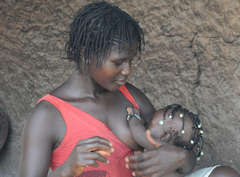The effect of maternal depressive symptoms on infant feeding practices in rural Ethiopia [06.04.21]
Maternal depression and other psychosocial factors have been shown to have adverse consequences on infant feeding practices. Prof. em. Biesalski and Dr. Scherbaum investigated with their partners from the College of Health Sciences of Jimma University (Ethiopia), Tufts University in Boston (USA) and MLU Halle-Wittenberg a multitude of factors related to IFPs. They suggest coordinated, multi-sectoral and multi-stakeholder interventions including maternal depressive symptoms screening and management to improve infant feeding practices (Woldetensay eta al, 2021).
Original Article
Woldetensay, Y.K.a,b, Belachew, T.c , Ghosh, S.d, Kantelhardt, E.J.e,f, Biesalski, H.K.a,b, Scherbaum, V.a (2021): The effect of maternal depressive symptoms on infant feeding practices in rural Ethiopia: community based birth cohort study. In: International breastfeeding journal 16 (1), S. 27. DOI: 10.1186/s13006-021-00375-3.
Affiliations
a Institute of Nutrition Science (140a), University of Hohenheim, Stuttgart, Germany
b Food Security Center, University of Hohenheim, Stuttgart, Germany
c Department of Population and Family Health, College of Health Sciences, Jimma University, Jimma, Ethiopia
d Tufts University, Friedman School of Nutrition Science and Policy, Boston, United States
e Department of Gynecology, Faculty of Medicine, Martin-Luther University, Halle, Germany
f Institute of Medical Epidemiology, Biostatistics, and Informatics, Faculty of Medicine, Martin-Luther University, Halle, Germany
Abstract
Background: Maternal depression and other psychosocial factors have been shown to have adverse consequences on infant feeding practices. This study explored the longitudinal relationship of maternal depressive symptoms and other selected psychosocial factors with infant feeding practices (IFPs) in rural Ethiopia using summary IFP index. Methods: This study uses existing data from the ENGINE birth cohort study, conducted from March 2014 to March 2016 in three districts in the southwest of Ethiopia. A total of 4680 pregnant women were recruited and data were collected once during pregnancy (twice for those in the first trimester), at birth, and then every 3 months until the child was 12 months old. A standardized questionnaire was used to collect data on IFPs, maternal depressive symptoms, household food insecurity, intimate partner violence (IPV), maternal social support, active social participation, and other sociodemographic variables. A composite measure of IFP index was computed using 14 WHO recommended infant and young child feeding (IYCF) practice indicators. High IFP index indicated best practice. Prenatal and postnatal maternal depressive symptoms were assessed using the patient health questionnaire (PHQ-9). Linear multilevel mixed effects model was fitted to assess longitudinal relationship of IFPs with maternal depression and other psychosocial factors. Results: Reports of higher postnatal depressive symptoms (ß = − 1.03, P = 0.001) and IPV (ß = − 0.21, P = 0.001) were associated with lower scores on the IFP index. Whereas, reports of better maternal social support (ß = 0.11, P = 0.002) and active social participation (ß = 0.55, P < 0.001) were associated with higher scores on the IFP index. Contrary to expectations, moderate household food insecurity (ß = 0.84, P = 0.003), severe household food insecurity (ß = 1.03, P = 0.01) and infant morbidity episodes (ß = 0.63, P = 0.013) were associated with higher scores on the IFP index. Conclusions: Overall, a multitude of factors are related to IFPs and hence coordinated, multi-sectoral and multi-stakeholder interventions including maternal depressive symptoms screening and management are needed to improve infant feeding practices. © 2021, The Author(s).


